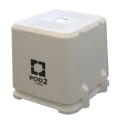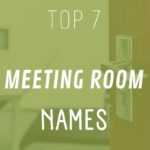A Smart Office is a technological workplace that gives its occupants control over their working environment by connecting them to the building. An ecosystem of platforms, IoT, hardware and software brings the workplace to life.
Thanks to Smart Office technology, many workspaces have evolved into unique, intelligent buildings that promote well-being and significantly improve business performance.
In this article you will learn about the basic principles of the Smart Office, its benefits, and 5 products that will bring your office into the era of intelligent working.
How does Smart Office work?
Smart Office has software that functions as a remote control for the office. From an app, users have a real-time overview of their workplace. This overview is fed by occupancy data, collected by smart sensors and Wi-Fi. This makes it possible, for example, to find out which workstations are available, where colleagues are or which meeting rooms appear to be empty.
Smart Office platforms can be integrated with various systems, including :
- Room reservation systems
- Smart lockers
- Intelligent parking applications
- Integrated building management systems (BMS)
- etc.
The benefits of Smart Office
Implementing smart technology in an office environment has many advantages.
Firstly, it can improve staff wellbeing and productivity. It can help automate many processes, freeing staff to focus on higher value-added tasks rather than repetitive ones.
In addition, a smart office is much more secure: security devices such as Wi-Fi sensors and security cameras can be integrated. The data they contain is easily accessible in real time. Cloud-based solutions can help increase security and compliance in the workplace, as they are managed by specialised companies that invest heavily in security.
Finally, smart offices play an important role in saving energy. When sensors detect that no one is in the room, lighting, heating and air conditioning systems are automatically switched off to save energy.
5 products to bring your office into the era of the Smart Office
You can now design your workspace incorporating technologies from the Smart Office philosophy, such as :
1. Air quality monitor
Air pollutants can cause or aggravate allergy symptoms and irritation, as well as lung disease or more serious health problems.
Recently, air quality factors have become even more important in shared spaces. In addition to measuring air quality factors, sensors can be used to check the correct use of air conditioning. All of this can be monitored remotely in a cloud-based system.
Motilde recommends :

POD2 from Ellona
Indoor air quality sensor connected with 5 sensors: CO2, humidity, temperature, chemicals in the air (VOC) and air pressure.
POD2 goes one step further, as it is able to accurately detect :
- Any foreign molecule in the air, thanks to its impressive database
- Noise, light, vibration
In addition, a QR code system allows occupants to report any anomalies detected on site.
Finally, POD2 shows a particularly interesting data for collective spaces such as meeting rooms: the Viral Transmission Index; this index warns of the risk of virus transmission based on the analysis of 4 key factors in this process:
- PM2.5.
- Fine particles
- Temperature and humidity
- C0²
It is therefore one of the most comprehensive sensors on the market, coupled with an extensive database.
2. Connected kiosk for visitor management
Electronic kiosks are an increasingly secure and reliable way to manage the flow of visitors to your business or sales area. Virtual ticket distribution, badge reader, calendar and appointment management, site map… the options are numerous.
3. Lighting management solution
Getting the right lighting in your office is crucial, especially for the safety and performance of your employees. Almost all suppliers of intelligent lighting solutions offer products that include the following features:
- Presence detection
- Constant light control (daylight detection to adjust artificial light)
- Application control / Remote access
4. Connected locks
Smart locks use a wireless protocol to perform the functions of locking and unlocking a door. The device makes it possible to unlock the office door with the connected smartphone or watch (and therefore remotely) and distribute virtual keys to employees.
5. Room booking system
Room booking systems are used by companies, conference and event organisers and hotel companies to reserve rooms and workspaces. Booking online or via the app is a convenient way to ensure the availability of facilities for meetings and other activities. Tracking and analysis functions contribute to an efficient use of resources.
Do you want to digitise a collaborative workspace? Contact our experts for a personalised quote.
Passionate about crafting workspaces that ignite collaboration, innovation, and productivity?
Download our free Ebook :







